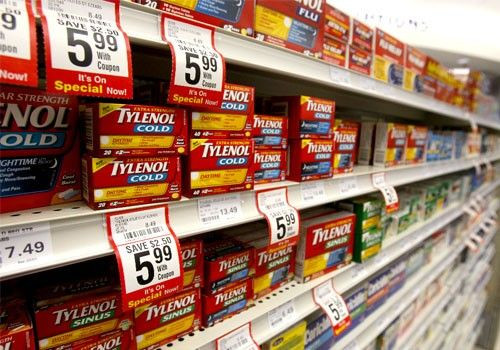Tylenol Maker Lowers Dosage of Painkiller Drug

McNeil Consumer Healthcare said on Thursday it plans to lower the maximum recommended dosage on regular Tylenol and other acetaminophen-containing products beginning next year.
Pharma-giant Johnson & Johnson's units are lowering the maximum daily dosage it recommends for Extra-Strength Tylenol pills to a level that was called for by medical experts about two years ago.
Although, the reduced recommendation, to six pills a day, or 3,000 milligrams, rather than eight pills, or 4,000 mg, will appear on Extra-Strength Tylenol product packages in the U.S. starting this fall.
The decision spawned from a number of recommendations made to the U.S. Food and Drug Administration in 2009, which specified lowering the maximum daily dose of acetaminophen in over-the-counter drugs to 2,600 milligrams instead of 4,000 milligrams.
Experts also urged the company to make extra-strength 500-milligram doses of the drug available only by prescription. Johnson & Johnson has been working to recover from a series of product recalls over the past couple years, including over-the-counter medicines such as Tylenol.
In June, McNeil rolled out another recall of 60,912 bottles of its Tylenol Extra Strength pain relief medicine was prompted by reports of a musty, moldy odor, after a series of recalls from the company in the recent past.
Here is a breakdown of the Tylenol recall in June:
What?
Johnson & Johnson issued another recall notice Wednesday for its Tylenol products. The company that has come under the scanner for recalls spanning back to two years took the step after receiving reports of a musty, moldy odor.
The recall affects one lot - ABA619 - of Tylenol pain killers, manufactured in February 2009. The bottles bear the label that reads: Tylenol Extra Strength Caplets, 225 count.
It bears a UPC code of 300450444271.
Why?
Reports suggest that the smell is caused by trace amounts of 2,4,6-tribromoanisole (TBA).
What is all the noise in the news?
Due to recalls over the past two years, J&J has recalled 100 million products over the past two years. These recalls have caused a shortage of Tylenol, Motrin, Sudafed, and Benadryl in drugstores.
Moreover, Johnson & Johnson has hit the headlines in the past six months for announcing two massive recalls. In January 2011, Johnson & Johnson announced recall of close to 43 million packages of Tylenol, Benadryl, Sudafed and Sinutab products from wholesalers citing past manufacturing practices like insufficient equipment cleaning systems. In April 2011, the neurologics division of Ortho-McNeil-Janssen Pharmaceuticals, a J&J unit, recalled about 57,000 bottles of Topamax, a neurology drug.
With so many recalls the company is battling a dwindling trust in consumers over its manufacturing and quality control issues.
Why should you care?
Although TBA has not seemed to pose any serious health threats, the exposure to the chamical is reported to have caused temporary stomach upset in some people.
What should you do?
If you are one among the consumers with the recalled Tylenol products:
- Stop taking the pain reliever.
- Contact McNeil Consumer Healthcare on 888-222-6036 or via www.tylenol.com for information on about receiving a refund or product coupon.
About Tylenol:
Tylenol's generic names include Paracetamol and Acetaminophen. It is an analgesic medicine. Tylenol is widely prescribed by doctors. Tylenol in the right doses is considered to have a superior safety profile compared with other over-the-counter pain relievers.
Tylenol is used to reduce fever and for the temporary relief of minor aches and pains such as:
- Headache
- Backache
- Toothache
- Minor pain of arthritis
- Common cold
- Muscular aches and cramps
© Copyright IBTimes 2024. All rights reserved.





















